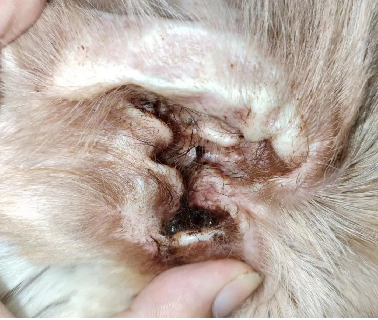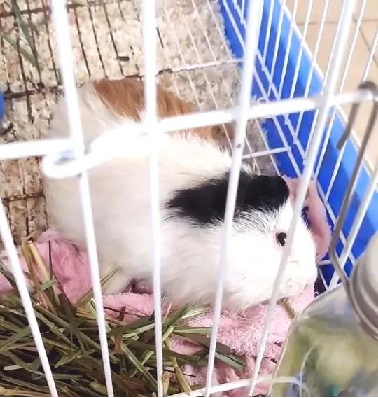Inflammation and swelling of pet ears
Ordinary domestic pets, whether they are dogs, cats, guinea pigs, or rabbits, are often plagued by ear diseases from time to time, and breeds with folded ears are usually more susceptible to different types of ear diseases. These diseases include otitis media, otitis media, otitis externa, ear mites, and ear hematomas from the inside out. Among them, otitis externa can also be divided into fungal infections and bacterial infections due to its causes. Among all these diseases, ear hematomas are relatively serious.
External ear hematoma, in simple terms, refers to the sudden swelling of a thin layer of skin on the auricle. The swelling is caused by the presence of fluid, which may be blood or pus, and can be clearly seen when squeezed out through puncture. If there is blood inside, it is mostly due to frequent head shaking centrifugal force causing the rupture of ear capillaries and bruising. The reason for head shaking is definitely discomfort such as ear pain or itching; If there is pus inside, it is basically an abscess caused by bacterial infection;
The most common cause of ear swelling is ear infection. Cats, dogs, and guinea pigs may experience redness and swelling in their inner ears, accompanied by pain, inflammation, redness, and a warm feeling when touched. At this time, you may see them shaking their heads or tilting their heads, rubbing the cage railing with their ears or scratching their ears with their paws to relieve stimulation. For more severe infections, pets may also experience disorientation, tilting and swaying while walking, circling as if drunk. This is because ear infections can disrupt the inner ear balance system, leading to dizziness. If scabs and swelling appear in the ears, it may be a precursor to fungal or bacterial infections.
Equally common as ear infections are ear itching caused by parasitic mite bites, hematomas and abscesses caused by frequent scratching injuries, and black or brown mud like substances on a pet’s swollen ears indicating possible infection with ear mites or other parasites. Parasites rarely affect the inner ear and disrupt the balance of pets. Most of them only cause severe itching and repeated scratching, leading to external injuries in pets. In addition to choosing LoveWalker or Big Pet according to weight, it is also important to use ear wash on time to treat the ears and disinfect the living environment to prevent secondary infections.
I once conducted a survey where only 20% of cat and dog owners would scientifically clean their pets’ ears every week, while less than 1% of guinea pig owners could clean their guinea pig ears on time every month. A large amount of earwax in a pet’s ear may cause swelling, which can clog the ear and worsen the problem. It can also attract parasites. Do not try to clean the earwax with a cotton swab or ear scoop. All pet owners need to do is choose the right ear wash and clean the earlobe and ear canal at a scientific time. Dirt will naturally dissolve and be thrown out.
The last cause of pet swelling is fighting and trauma. Whether it’s cats, dogs, guinea pigs, or rabbits, they are actually very aggressive. They often argue endlessly and even use their teeth and claws to bite and scratch each other’s ears, leading to ear infections, redness, and swelling. Other pet owners are accustomed to using cotton swabs to deeply wipe away dirt inside their ear canals, which may also cause ear canal damage and swelling.
It is recommended that all pet owners regularly clean their ears with ear wash suitable for their breed, avoid water entering the ear canal during bathing, and clean their ears separately after bathing. If a pet frequently scratches its ears or shakes its head, it is necessary to take it seriously and carefully check if there is any disease in the ears. If there is ear swelling, please consult a doctor immediately. The earlier the treatment and recovery, the better the effect.
Post time: Sep-23-2024


